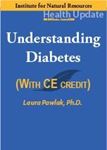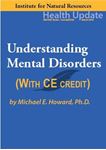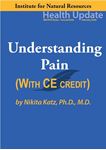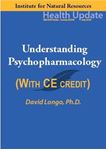You have no items in your shopping cart.
Streaming Video w/CE Credit
Understanding Diabetes - Streaming Video - 6 Hours (w/Home-study Exam)
Compares and contrasts the different forms of diabetes. Explains why the number of cases of Type 2 diabetes is expanding worldwide. Describes how gut health impacts metabolic health and diabetes risk. Outlines potential complications of diabetes as well as appropriate interventions. Recognizes how insulin resistance and Type 2 diabetes are linked to other conditions such as cognitive decline, depression, cancer sleep disorders, and periodontal disease. States the rationale for individualized blood sugar targets. Outlines the specific strategies to prevent, manage, and potentially reverse Type-2 diabetes, including lifestyle, surgical, and pharmacologic interventions. Describes how the information in this course can be utilized to improve patient care and patient outcomes. Describes, for this course, the implications for dentistry, mental health, and other health professions.
$83.00
Understanding Emotional Intelligence - Streaming Video - 6 Hours (w/Home-study exam)
Outlines the characteristics of emotions and their importance in human social behavior. Lists the five major domains of emotional intelligence. Explains the effects of emotional intelligence and social intelligence on love, happiness, and work. Describes strategies to improve self-awareness, self-management, social awareness, and relationship skills. Explains how emotional intelligence impacts mental disorders, chronic illness, provider-patient relationships, and stress management. Outlines how the information in this course can be utilized to improve patient care and patient outcomes. Describes, for this course, the implications for dentistry, mental health, and other health professions.
$83.00
Understanding Mental Disorders - Streaming Video - 6 Hours (w/Home-study Exam)
Describes how the brain produces behavior and how learned patterns of behavior become a personality. Lists the personality disorders and explain how they disrupt relationships. Discusses how to diagnose and treat the major anxiety disorders, including dental anxiety, and outline the effects of early life stress, medical disorders, and medications on anxiety. Describes the characteristics of posttraumatic stress disorder and obsessive-compulsive disorder and explains why they are no longer grouped with anxiety disorders. Outlines the diagnostic criteria, course, and many treatment options for major depressive disorder and bipolar disorder. Describes how the information in this course can be utilized to improve patient care and patient outcomes. Describes for this course, the implications for nursing, dentistry, mental health, and other health professions.
$83.00
Understanding Pain - Streaming Video - 6 Hours (w/Home-study exam)
Lists the neurologic processes causing pain and suffering and the principles of pain assessment. Discusses treatment modalities for primary and secondary headaches, including migraine and rare cephalagias. Lists the “red flags” of medication abuse and approaches to reduce opioid addiction. Describes the differential diagnosis of dental vs. cervical and cervicogenic pain and the appropriate intervention for both. Lists steps involved in the diagnosis and management of spinal pain, including physical and occupation therapy. Describes how the information in this course can be utilized to improve patient care and patient outcomes. Describes for this course, the implications for nursing, dentistry, mental health, and other health professions.
$83.00
Understanding Psychopharmacology - Streaming Video - 6 Hours (w/home-study)
This seminar will review the basic function of neurons and drug actions, followed by an explanation of neurotransmitters and their function in the brain. General prescribing strategies will be presented, as well as common psychotropic medication side-effects and medical/behavioral management of these effects. Major psychological disorders will be presented along with the specific class of psychotropic medication indicate for a diagnostic category. These categories include: psychotic/schizophrenic (neuroleptics), anxiety disorders (rescue anxiolytics), depression (antidepressants), bipolar disorders (mood stabilizers, anti-seizure medications, and second generation anti-psychotics), Alzheimer’s disease (NMDA antagonists & AChE inhibitors), attention deficit disorder & hypersomnolence (stimulants), insomnia (hypnotics), addiction, and special populations (children & the elderly). In addition to psychotropic medication treatment of mental disorders, the necessity for psychotherapy will be emphasized for each mental health disorder in terms of increased treatment efficacy, long-term outcome, and maintenance of treatment gains. The most current empirical evidence which supports the seminar material will be incorporated into CE program to assure participants become cognizant of the treatment-of-choice for specific psychological disorders
$83.00





